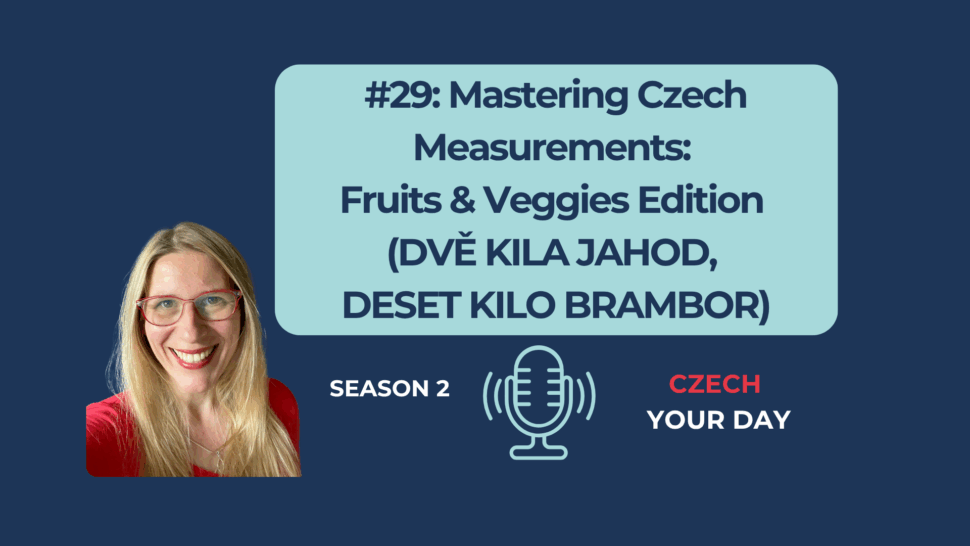Mastering Czech Measurements: Fruits & Veggies Edition(S02/E29 – daily podcast CZECH YOUR DAY)

THIS WEEK’S TOPIC: NA TRHU/AT THE MARKET
THE TRANSCRIPT/HANDOUT IS DOWN BELOW
In tomorrow’s episode we will listen to a story at the market. To be able to understand it (and for you to be able to buy amounts of veggies and fruits in Czech), we need to cover today how veggies and fruits change after the amounts.
That’s why I am showing you the base form in plural first and then the form with the amounts (eg. ty jahody – čtvrt kila jahod) so that you can clearly see the changes.
I have grouped the veggies and fruits from the previous weeks – in this way it will be easier for you to see the patterns.
It’s essential to note that today we’ll only cover items typically used in plural form, as including singular items would be overwhelming.
Fruits and Veggies in Plural
The practice is key! Let’s explore some common plural forms paired with quantities:
- PLURAL FEMININE :
- Ty jahody (strawberries), ty ostružiny (blackberries), ty papriky (peppers), ty cukety (zucchinis):
- Čtvrt kila jahod (Quarter of a kilo = 250g strawberries),
- Půl kila ostružin (Half a kilo = 500g blackberries),
- Tři čtvrtě kila paprik (Three-quarters of a kilo = 750g peppers),
- Kilo cuket (Kilo of zucchinis).
- The beauty of these expressions is their simplicity: once you recognize the plural form, you only have to remove the last letter ‚Y‘ to adjust the word accordingly.
- Ty borůvky (those blueberries), ty švestky (those plums), ty meruňky (those apricots), ty hrušky (those pears), ty okurky (those cucumbers):
- Dvě kila borůvek (Two kilos of blueberries),
- Tři kila okurek (Three kilos of cucumbers),
- Čtyři kila švestek (Four kilos of plums),
- Pět kilo hrušek (Five kilos of pears),
- Deset kilo meruněk (Ten kilos of apricots).
Can you see the extra -E/-Ě sound?
PLURAL MASCULINE:
In this category, we’ll look at some common masculine nouns and their quantity expressions:
- Ty pomeranče (oranges), ty batáty (sweet potatoes):
- Jedenáct kilo pomerančů (Eleven kilos of oranges),
- Dvanáct kilo batátů (Twelve kilos of sweet potatoes).
- PLURAL NEUTRAL:
- Ta jablka (apples), ta granátová jablka (pomegranates), ta rajčata (tomatoes):
- 15 kilo jablek (15 kilos of apples),
- 20 kilo granátových jablek (20 kilos of pomegranates),
- 30 kilo rajčat (30 kilos of tomatoes).
Watch out this irregularity:
to rajče – ta rajčata (a tomato – tomatoes)
- It’s the same pattern as to kuře – ta kuřata (a chicken – chickens)








